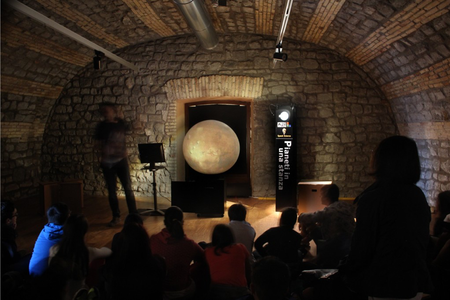Europlanet has launched a 10 million Euro project, the Europlanet 2024 Research Infrastructure (RI), to provide open access to the world's largest collection of planetary simulation and analysis facilities, as well as a global network of small telescopes, data services, and community support activities. Europlanet 2024 RI aims to widen participation in planetary science and provides the infrastructure to address key scientific and technological challenges facing the planetary research community.
Europlanet has launched a €10million project, the Europlanet 2024 Research Infrastructure (RI), to provide open access to the world’s largest collection of planetary simulation and analysis facilities, as well as a global network of small telescopes, data services, and community support activities. Europlanet 2024 RI aims to widen participation in planetary science and provides the infrastructure to address key scientific and technological challenges facing the planetary research community.
The project is funded through the European Commission’s Horizon 2020 programme and will run for four years from February 2020 until January 2024. The Europlanet 2024 RI consortium is led by the University of Kent, UK, and has 53 beneficiary institutions from 21 countries in Europe and around the world, with a further 44 affiliated partners.
Europlanet 2024 RI will provide the planetary community with free “transnational access” to 24 laboratories in Europe and five field sites worldwide to carry out research projects. The Planetary Sciences Group is the partner leading the area of outreach and inspiration in the project, working in close collaboration with Vilnius University, The Dill Faulkes Educational Trust Limited and The National Institute for Astrophysics of Italy. The Planetary Science Group and its partners will develop the following activities:
- The Europlanet Public Engagement Funding Scheme, which awards seed-funding of €5-10K for projects to engage and widen participation in planetary science among stakeholder groups, including citizens, educators and schools.
- The Annual Europlanet Prize to honour outstanding achievement in public engagement related to planetary science and highlight the importance of outreach as a core part of the remit of the research community.
- A “ Train the trainers ” summer school will support Hub representatives and Early Career researchers to develop stakeholder training workshops (for engaging with the media, public, policy makers or educators) that can be delivered to regional planetary science communities.
- The “Planets in a Room” program, a low-cost, small, DIY spherical projector/planetarium dome projector that outreach providers (teachers, museums, planetary scientists and other individuals) can build and use for demonstrations and teaching on planetary science topics.




